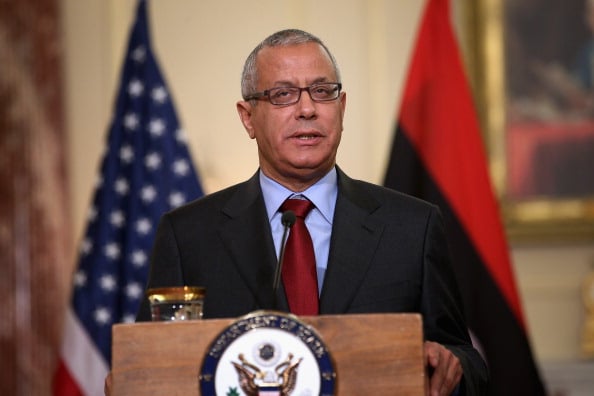Libyan PM Freed After Being Seized Over US Raid – Officials
Ali Zeidan was ‘kidnapped’ and held by militia for several hours on Thursday in Tripoli.

Former rebel gunmen freed Libya’s prime minister on Thursday after holding him for several hours in reprisal for the capture by U.S. forces at the weekend of a Libyan al Qaeda suspect in Tripoli, officials said.
A Reuters journalist at the scene said protesters had opened fire at the building where Ali Zeidan was being held to demand that the group, which is affiliated with the government, free the premier.
“The prime minister has been released,” a government official said. A security source also said Zeidan was free.
Two years after a revolution ended Muammar Gaddafi’s 42-year rule, Libya is in turmoil, with its vulnerable central government and nascent armed forces struggling to contain rival tribal militias and Islamist militants who control parts of the country.
The militia, which had been hired by the government to provide security in Tripoli, said it “arrested” Zeidan after U.S. Secretary of State John Kerry said Libya had a role in the weekend capture in the city of Abu Anas al-Liby.
“His arrest comes after … (Kerry) said the Libyan government was aware of the operation,” a spokesman for the group, known as the Operations Room of Libya’s Revolutionaries, told Reuters.
Before his release, an official in the Interior Ministry anti-crime department told the state news agency that Zeidan, a former diplomat and exile opposition activist against Gaddafi, was being held there and was being treated well.
The Libyan government in a statement confirmed the premier was taken at dawn to “an unknown place for unknown reasons.”
The prime minister was taken from the Corinthia Hotel, where many diplomats and top government officials live. It is regarded as one of the most secure places in Tripoli.
The kidnapping, however brief, raised the stakes in the unruly OPEC nation, where the regional factions are also seeking control over its oil wealth, which provides Libya with the vast bulk of government revenues.
Brent oil prices rose on the news.
“Everybody is watching this… We still haven’t seen any disruption to supply from Libya, so we don’t expect a spike in prices,” said Ken Hasegawa, a commodity sales manager at Newedge Japan.
A mix of striking workers, militias and political activists have blocked Libya’s oilfields and ports for more than two months, according to Oil Minister Abdelbari Arusi, resulting in over $5 billion of lost revenues.
He said on Oct. 2 that oil exports could return to full capacity in days once the strikes ended.
Repsol and Eni, involved in western Libya, have seen output largely restored since fields reopened last month. But companies invested in eastern Libya are entering a third month of closures at several important export terminals.
Oil companies have become more wary of North Africa after an attack in January on the Amenas gas plant in neighbouring Algeria, a top gas supplier to Europe and an oil-producing OPEC member.
UNKNOWN LOCATION
U.S. special forces on Saturday seized Nazih al-Ragye, known by his alias Abu Anas al-Liby – a Libyan suspected in the 1998 bombings of U.S. embassies in Kenya and Tanzania. Liby is being held on a Navy ship in the Mediterranean Sea.
After Zeidan was seized, the U.S. State Department said it was “in close touch with senior U.S. and Libyan officials on the ground.”
The Operations Room of Libya’s Revolutionaries had been affiliated with the Interior Ministry which assigned them to provide security in the capital as part of a programme to reintegrate former fighters.
Guards at the hotel said there were no shots fired or clashes during the incident.
Al-Arabiya television channel quoted Libya’s justice minister as saying that Zeidan had been “kidnapped” and showed what it said were video stills of Zeidan frowning and wearing a grey shirt undone at the collar surrounded by several men in civilian clothes pressing closely around him.
Zeidan said on Tuesday Libyans accused of crimes should be tried at home, but that the raid to capture Liby would not harm U.S. ties – trying preserve relations with a major ally without provoking a backlash from Islamist militants.
But the raid angered militant groups, including one blamed for the assault on the U.S. consulate in Benghazi in 2012, who called for revenge attacks on strategic targets including gas export pipelines, planes and ships, as well as for the kidnappings of Americans in the capital.
